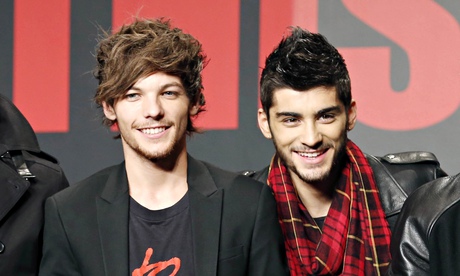
It wasn't exactly "where were you when JFK was assassinated?", granted, but Blue Peter's Richard Bacon getting caught with cocaine in 1999 was a seminal moment. We crowded around the TV – solemnly – as the head of BBC children's programmes, Lorraine Heggessey, made a special broadcast which bizarrely mimicked a teacher informing a class of bewildered kids that one of their fellow pupils had been booted out of school. "There has been a sad event," she explained, even falling back on that immortal line "he's not only let himself and the team down, but all of you down too". Bacon got the chop, even being forced to hand back his Blue Peter badge – the indignity! – and suffered such terrible consequences as becoming a highly successful TV and radio broadcaster. Liberated from his clean-cut, all-smiling children's TV presenter persona, he was now free to do grown-up broadcasting.
As a video purporting to show One Direction members Zayn Malik and Louis Tomlinson allegedly smoking a spliff in Peru provoked outrage on social media, I couldn't help but flash back to Bacon-gate. The pressure on One Direction to conform to the sort of clean-living that Jesus's disciples would find a little stringent is even more intense, of course. One Direction are not just a band, they're a product, and Simon Cowell's most lucrative creation, too. They're the richest boy band in Britain. I can imagine the media mogul grinning cheerfully as he promises the band all the wealth and attention in the world – before his mood darkens momentarily with a warning to keep away from the wacky backy. One Direction's music is only a sliver of their success: their fame depends on millions of teenage girls (and maybe the odd boy) staring dreamily at a poster of the likes of Malik, picturing him as the perfect boyfriend. Any disruption to the band's carefully crafted image could – in the panicky imagination of the band's managers – spell commercial disaster.
The response to these revelations was always going to be intense, to say the least. One Direction fans can be an intense bunch. I have endured a number of social media storms in my time, but nothing – and I mean nothing – can prepare you for the wrath of the One Direction fandom. When the Kooks' frontman, Luke Pritchard, had a pop at the band, he received a flurry of death threats, saying "it was like I had clubbed baby seals". Aston Villa striker Gabriel Agbonlahor also suffered death threats after he injured Louis Tomlinson in a charity game. When One Direction's Liam Payne got a dog, some fans were so jealous that they threatened to kill it. Blimey.
Some fans, it seems, are heartbroken, with reports of them ripping up and burning their concert tickets, and demanding an apology. But otherwise, the "fandom" – as they call themselves – are rallying behind the band, and crushing any dissent online. "The One Direction fandom is now a part-time lawyer," pledged one fan. Fellow bandmate Harry Styles is apparently unimpressed, the band's sponsors such as PepsiCo may get nervous and there is even a chance the US could refuse them entry – as Nigella Lawson recently absurdly found.
But actually, this saga could be a boon. Not to upset One Direction fans, but both they and the band will age. One in five young people admit to dabbling with cannabis in the last year. Our absurd drug laws allow endless consumption of alcohol, a far more damaging drug, and yet treat young people inhaling a bit of weed as criminals. The young pin-ups' clean-cut image will not always be as lucrative.
As branding experts are already suggesting, this "scandal" could help them, giving them a new credibility. In any case, young people in the media either appear as the asbo "broken Britain" generation, or the sanitised near-saints of young pop stars. Most young people are neither – and any puncturing of both expectations is no bad thing.

